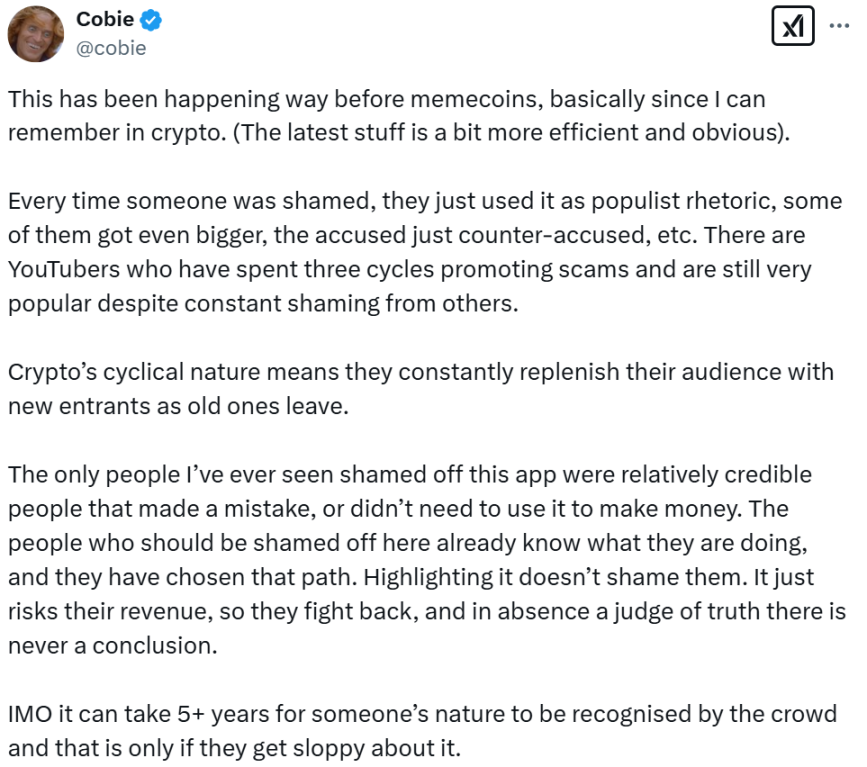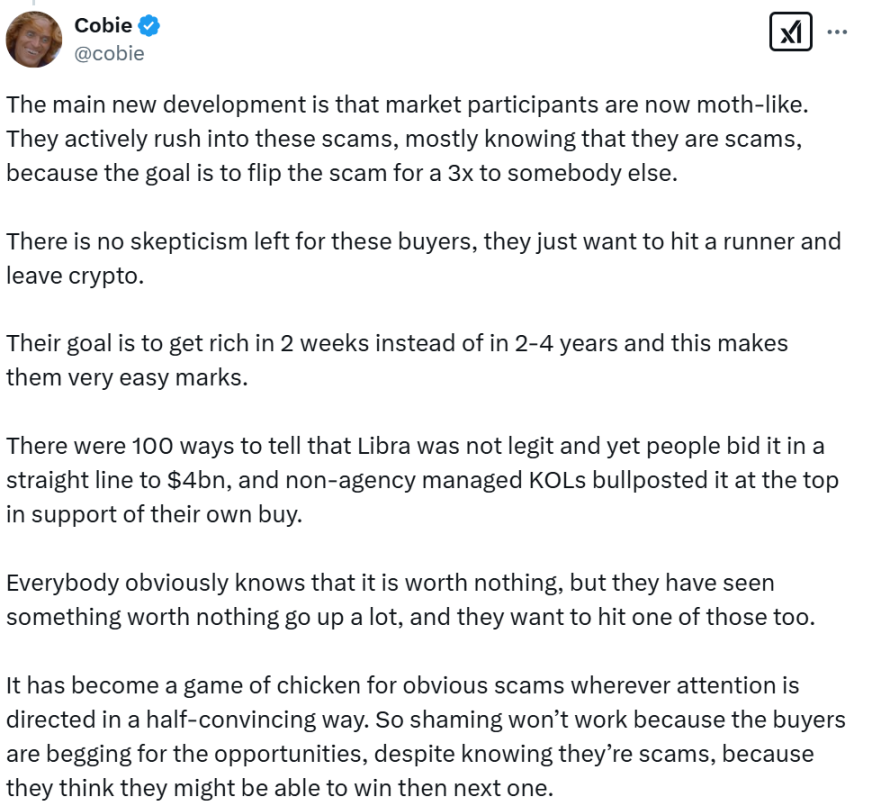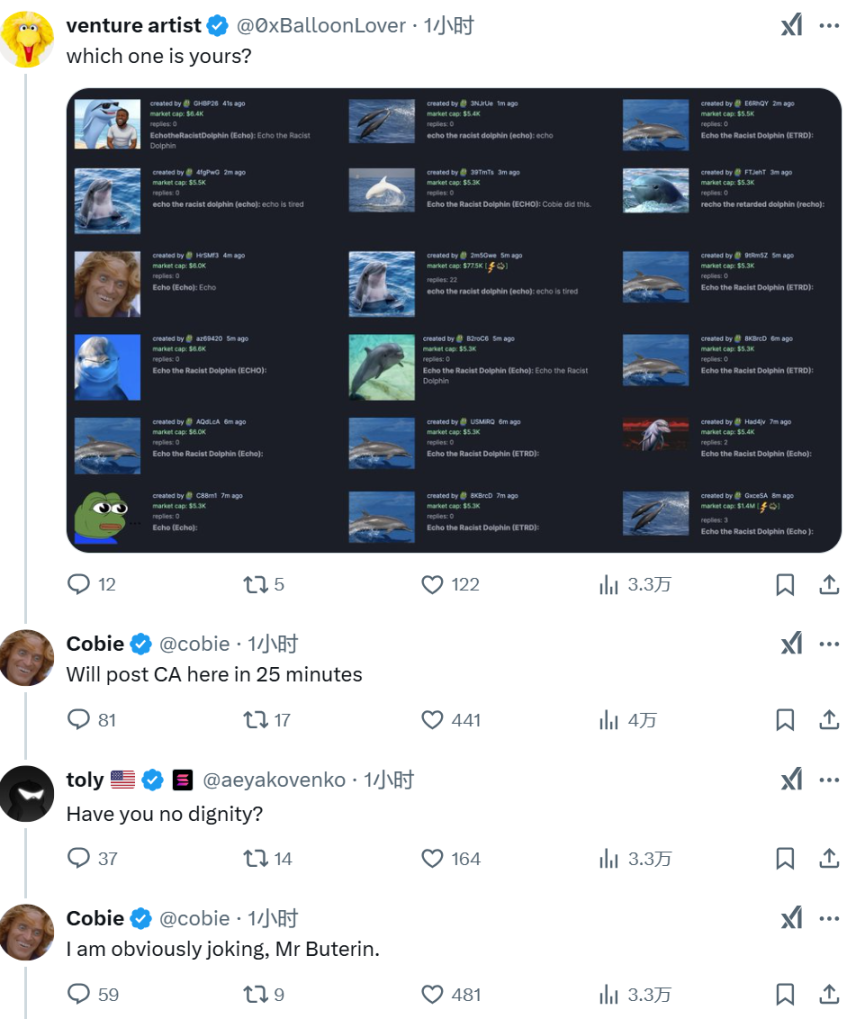A LIBRA meme coin takeover game has caused a stir in the cryptocurrency community. On February 15, the Argentine president announced the launch of the meme coin LIBRA and revealed its contract address, which subsequently skyrocketed, reaching a market cap of over $4 billion at one point. However, within just a few hours, the coin's price quickly plummeted, currently standing at $0.36, with a market cap of less than $400 million. Just hours after posting a tweet promoting the meme coin, the Argentine president deleted the previous promotion and stated, "I originally thought it was just casual support for a private entrepreneurial project unrelated to me. I was not aware of the project's details, and after learning more, I will definitely not promote it again (this is also the reason for deleting the tweet)."
Investors who jumped into this "shitcoin" frenzy suffered heavy losses. Solayer developers Chaofan Shou and Tonykebot lost over $2 million in this venture and revealed that the team behind LIBRA consists of core members of KIP Protocol, vowing to hold them accountable. The losses extend beyond these two individuals; according to monitoring by lmk.fun, based on trading records, a total of 24 traders lost over $1 million on LIBRA, and 61 traders lost over $500,000. The largest loser incurred a loss of $5.17 million, having spent $5.6 million to purchase 2.1 million tokens, ultimately selling them for just $430,000. Correspondingly, as of February 15, eight wallets associated with the LIBRA team had obtained 57.6 million USDC and 249,671 SOL (approximately $49.7 million) through liquidity provision, liquidity removal, and fee collection, totaling about $107 million in cash out.
The insider trading of meme coins, the influence of celebrity promotions, and the fast-paced game of flipping coins have once again become the focus of market attention.
Today, Paradigm researcher Samczsun, Solana co-founder Toly, and crypto KOL Coobie discussed their views on Twitter.
Conspiracy Groups and KOLs
Samczsun initiated the discussion by asking: Will this event lead to some responsible parties being held accountable on a societal level?
In response, Toly expressed a pessimistic view, stating that "the social layer's group judgment is problematic in itself because it is a passive reaction to the outcome, rather than based on a set of pre-established and recognized rules." Attackers can infinitely generate failed tokens, becoming the sole bidders, acquiring most of the supply, and then transferring the contract address to KOLs. In Toly's view, the only solution is to enforce social credit scores for users and reject tokens with low scores.
Samczsun followed up by asking, if meme coins controlled by insiders are bad, why not formally exclude all participants from the start? This way, in the short term, the benefits of one-time profits would not compensate for the cost of being excluded, and in the long term, such behavior would be fundamentally unprofitable.
Toly's answer was straightforward: after promoting the contract address, KOLs would be rejected by their fan base, and the conspiracy group would then turn to the next KOL.
Cobie stated that many KOLs do not even know who they are dealing with or what they are promoting. They are simply told by agents that if they tweet about it, they will receive X coins.
If KOLs and their agents are informed about obviously bad things, will KOLs take responsibility for their actions? Perhaps we often see certain tokens proven to have multiple insider trading and fraud cases, yet no one faces any form of punishment.
The reputations of some KOLs have indeed been affected, partly because of the question: "How do we define good and bad in meme coins? Even in completely unintentional free market token distribution, the top 20% of holders will end up owning over 80% of the tokens." Toly provided his answer.
At this point, Cobie bluntly explained that there is currently no effective way to shame those shameless individuals. He then posted a lengthy tweet to elaborate on his views.
"This situation has existed long before meme coins appeared; it has basically been this way since I first touched the crypto industry. (These recent operations are just more efficient and obvious.) Every time someone is shamed, they use it as populist rhetoric, and some even become more popular because of it. Those accused will just turn around and accuse others, creating opposition. For example, some YouTubers have promoted scams for three consecutive cycles, and despite constant exposure, they remain popular. The cyclical nature of the crypto industry means there will always be new entrants to fill the void left by old users, so these individuals can always find new audiences.
The market lacks truth and regulation, and the results often end up inconclusive.
In Cobie's view, the only people who have truly been shamed into leaving the space are either those who were relatively reputable but made mistakes or those who do not need to rely on this industry for income. Those who truly should be expelled are already aware of what they are doing and have made their choices. Exposing them will not make them feel ashamed; it only threatens their income, so they will retaliate. In the absence of "truth arbiters," debates often have no final conclusion.

Additionally, Cobie stated that it may take over five years for the public to truly recognize human nature, and this is predicated on them making obvious mistakes in the process.
"If deceivers are not threatened with losing their freedom, it is almost impossible to prevent them from continuing to commit fraud."
The Takeover Game Falls into an Unsolvable Dilemma
Currently, the controversial overvalued VC coins and the fast-paced issues within meme coins have drawn sharp comments from Cobie, who stated that the current market development trajectory is that market participants are like moths drawn to these scams. Most people know these are scams, but their goal is to sell them to the next buyer at three times the price. They just want to get rich in two weeks, not in 2-4 years. Players hope to hit the jackpot in the next round.

If there is no way to stop them, then avoiding participation may be a solution.
Cobie stated that the behavior of investors/players is easy to change. If you lose ten times, you will stop playing the game. No one is buying VC coins anymore; in fact, some (very few) coins have been mispriced. They no longer buy these coins because they are tired of being drained.
Previously, Cobie wrote an article about high FDV low circulation VC coins, but he expressed disappointment that it did not achieve the desired goal and did not stop the public from buying these tokens. The only way to change investor behavior is for participants to lose enough. Only after experiencing pain will this group truly realize they should avoid participation.
Cobie wrote, "This, in turn, changes the behavior of token issuers; the public will no longer buy such products, so you can no longer easily issue this type of token."
In Conclusion
If you were to launch a token echo now and had to choose between two paths:
(1) Sell 25% to venture capital firms and insiders, retain 35% for the team, and launch a token that receives revenue distribution from Echo's business to holders, issued with low circulation;
(2) Sell 0% to anyone, keep 50% for yourself, and launch a memecoin called Echo the Racist Dolphin, which has no connection to Echo other than the name, deployed from my public wallet and tweeted from a CA account;
Which market cap do you think would be higher? Cobie provided his answer: the value of the memecoin (at least for now) would be higher than that of the VC coin. However, if the same experiment were conducted five years later, the results would be exactly the opposite.
Interestingly, in Cobie's comment section, a well-meaning individual posted a picture asking which token he mentioned.

Cobie stated he would release the contract address in 25 minutes, to which Toly commented: "Do you have any shame?"
Cobie responded that it was just a joke and mocked Toly using Buterin's name (the name of V God).
免责声明:本文章仅代表作者个人观点,不代表本平台的立场和观点。本文章仅供信息分享,不构成对任何人的任何投资建议。用户与作者之间的任何争议,与本平台无关。如网页中刊载的文章或图片涉及侵权,请提供相关的权利证明和身份证明发送邮件到support@aicoin.com,本平台相关工作人员将会进行核查。



